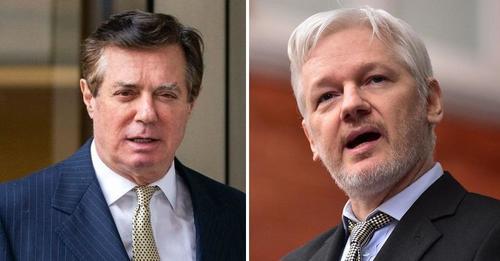WikiLeaks announced on Monday that it will commence its lawsuit against The Guardian over an “entirely fabricated” story that former Trump campaign manager Paul Manafort held secret meetings with Julian Assange in the Ecuadorian embassy – a report which has been largely discredited.
After raising $50,000 from 1,270 donors in a Gofundme campaign, WikiLeaks tweeted “Legal action will now commence,” adding “but more is required to complete.”
WikiLeaks fund to sue the Guardian for publishing fabricated front page stories has hit $50,000. Thanks to all 1270 donors so far. Legal action will now commence (but more is required to complete). https://t.co/VaoMESN5RO
— WikiLeaks (@wikileaks) January 14, 2019
WikiLeaks launched the crowdfunding campaign, promising to sue the Guardian “for publishing entirely fabricated story … which spread all over the world.”
WikiLeaks launches legal fund to sue the Guardian for publishing entirely fabricated story “Manafort held secret talks with Assange in Ecuadorian embassy” — which spread all over the world today. It is time the Guardian paid a price for fabricating news. https://t.co/VaoMESN5RO
— WikiLeaks (@wikileaks) November 27, 2018
The campaign story reads:
The Guardian has claimed, using unnamed sources, that former Trump campaign chairman Paul Manafort had “secret talks” with Julian Assange in the Ecuadorian Embassy in London on three occasions. These claims are completely false and the story has been fabricated. But it has gone viral, repeated uncritically by media outlets around the world.
In response to the article, Manafort issued a statement unequivocally denying the alleged visits.
“This story is totally false and deliberately libelous. I have never met Julian Assange or anyone connected to him. I have never been contacted by anyone connected to Wikileaks, either directly or indirectly,” reads Manafort’s statement. “I have never reached out to Assange or Wikileaks on any matter. We are considering all legal options against the Guardian who proceeded with this story even after being notified by my representatives that it was false.”
What’s more, the Ecuadorian embassy’s visitor logs show no such visits.
***
Story shredded by former top Ecuadorian diplomat
Following The Guardian‘s story, a former consul and first secretary at the Ecuadorian embassy in London refuted the paper’s wholly unsupported claim.
Fidel Narváez – who worked at Ecuador’s London embassy from 2010 – 2018 has told The Canary that The Guardian‘s claim is entirely false. The Canary has also reviewed a copy of correspondence between the Guardian and Narváez in which he makes a formal complaint accusing the paper of fabricating an earlier story about a Kremlin plot to smuggle Assange to Russia.
Both WikiLeaks and Manafort have said they plan to sue The Guardian over the publication, with Manafort slamming the report as “totally false and deliberately libellous.”
Narváez – initially consul and then first secretary at the embassy, told the Canary that to his knowledge, Manafort never visited the embassy while he was employed there. What’s more, his account supports points made by The Intercept‘s Glenn Greenwald about visitation rights at the embassy.
It is impossible for any visitor to enter the embassy without going through very strict protocols and leaving a clear record: obtaining written approval from the ambassador, registering with security personnel, and leaving a copy of ID. The embassy is the most surveilled on Earth; not only are there cameras positioned on neighbouring buildings recording every visitor, but inside the building every movement is recorded with CCTV cameras, 24/7. In fact, security personnel have always spied on Julian and his visitors. It is simply not possible that Manafort visited the embassy.
The Guardian responded to Narváez’s comments, stating:
“This story relied on a number of sources. We put these allegations to both Paul Manafort and Julian Assange’s representatives prior to publication. Neither responded to deny the visits taking place. We have since updated the story to reflect their denials.”
This answer is counter to a statement made by Manafort following the story’s publication, in which he said “We are considering all legal options against the Guardian who proceeded with this story even after being notified by my representatives that it was false.”
Furthermore, Manafort’s passport stamps also refute the Guardian‘s reporting, after the Washington Times reported that Manafort’s three passports reveal just two visits to England in 2010 and 2012, which support his categorical denial of the “totally false and deliberately libelous” report in The Guardian, which said that Manafort visited Assange in the Ecuadorian Embassy – ostensibly to coordinate on the WikiLeaks release of Hillary Clinton’s emails.
WikiLeaks, meanwhile, bet The Guardian “a million dollars and its editor’s head that Manafort never met Assange.”
This is going to be one of the most infamous news disasters since Stern published the “Hitler Diaries”.
— WikiLeaks (@wikileaks) November 27, 2018
via RSS http://bit.ly/2FsIfqn Tyler Durden
